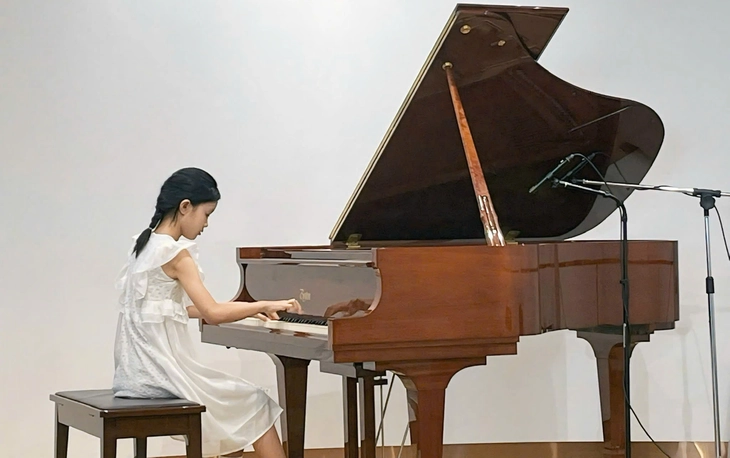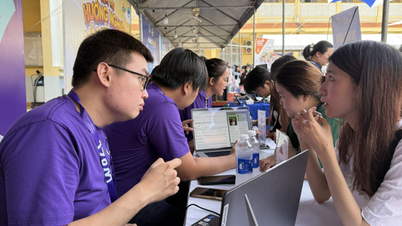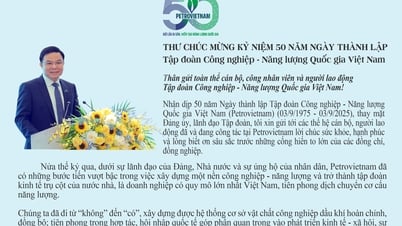
Piano is an art that many parents let their children learn.
The trend of genetic testing to discover children's talents and abilities is appearing a lot in big cities like Ho Chi Minh City and Hanoi.
At genetic testing centers, they perform genetic decoding test packages specifically for children's comprehensive development, including decoding personality traits such as extroversion or introversion, memory, language, and aptitude. Should we?
There is no complete genetic evidence yet.
One advertising center: "The innate talent genetic test is like a compass to help parents determine the right direction for their children."
"There are many different methods to discover a person's innate talent from birth. But gene decoding is considered one of the leading advanced methods for highly accurate analysis, which helps guide the nurturing and development of children's potential from an early age," another center loudly advertised.
Mr. PTC - 45 years old, living in Gia Dinh ward, Ho Chi Minh City - said he has a daughter who studied for nine years at the classical piano department of the Ho Chi Minh City Conservatory of Music. Many teachers highly appreciated her for playing the piano well.
His son excelled in English and literature. Mr. C. wondered whether he should orient his son towards art or culture. Finally, he decided to do a genetic test for his son.
This test package will decode your child's genes for language ability, memory, absolute sense of sound, introversion - extroversion, strength - sensitivity... The genetic test results show that your child only excels in language, has no talent for music .
Mr. TC shared that if he had done this test for his child when he was young, he probably would not have invested in professional piano lessons for his child. However, his child is currently studying very well. According to Mr. C., the genetic test results should only be used for reference.
Doctor Nguyen Khac Han Hoan, head of the medical genetic testing department at Tu Du Hospital in Ho Chi Minh City, said that almost all parents expect their children to develop exceptionally, become talented, successful and recognized by society.
Parents want to discover their children's talents early so they can invest in the right direction, taking advantage of the "golden period" in intellectual and skill development.
Grasping this need, recently the testing market has also actively researched and offered testing services with very attractive advertisements.
However, genetic testing to predict the talents of children and adults is still a field without sufficient evidence in genetics, medicine and sociology.
Genetic studies have determined that traits such as intelligence, athletic ability, music, or mathematics are complex, polygenic - multifactorial traits, influenced by many genes with very small effects and interacting closely with the environment (e.g., rearing conditions, education , nutrition, social experiences).
The gene variants discovered and published in some studies on giftedness are not accurate enough, and do not have enough scientific basis to predict in a personalized way and apply reliably to each child.
In standard medical practice, geneticists do not have any basis for ordering these tests. Therefore, we should not use them as a decision-making tool for children's future orientation.
Commercial genetic tests should not be used to assess aptitude.
The American College of Medical Genetics and Genomics (ACMG) also recommends against using commercial genetic tests to assess aptitude or academic potential because this can cause misunderstandings, unnecessary psychological pressure on children, and overshadow the role of comprehensive education and nurturing.
Dr. Hoan believes that parents should be close, focus on observing reality, encourage children to experience diverse experiences, and nurture their interests flexibly instead of setting expectations based on test results that lack scientific basis, leading to unfortunate mistakes that may occur, affecting the future of children.
Genetic testing, especially in the area of talent prediction, is not a foolproof tool.
These results are often based on a small number of genetic variants with very limited impact and are not reliable enough to confirm whether or not an individual is gifted in a particular area such as music, mathematics or sports.
Therefore, relying on test results to make educational decisions or future orientation can lead to unfortunate mistakes that cause parents to miss out on their children's true potential.
In other words, educational strategies should be based on observation, real-life experience, and nurturing passion rather than relying solely on inaccurate predictive genetic test results.
Genes are only a small factor.
Dr. Nguyen Kim Dung, former deputy director of the Institute of Educational Research (Ho Chi Minh City University of Education), said that children's development depends on four factors.
These are genetic factors (genes), family and social environment factors, nutritional factors and educational factors. When all four of these factors are present, children will be intelligent and develop in the best way. Thus, genes are only one of the four factors that help children develop.
Even when parents understand their children's strengths and weaknesses, they still need to develop their children in a good environment, with good nutrition and education so that they can develop in the best way.
Currently, the price of genetic testing to detect children's abilities is quite expensive (about several million VND/sample) and the accuracy of the test is not widely guaranteed.
While through daily observation and contact with children, parents and teachers can also assess children's abilities.
Therefore, the factor of understanding genes is only a small factor that parents should work with teachers to understand their children.
Genetic testing should not be used to determine career choices.
Dr. Hoan advises parents to create conditions for their children to have early and diverse exposure to academic, sports and artistic activities, and to interact with a community of other children with similar interests.
From there, observe your child's reactions, encourage curiosity, and note areas where your child shows interest or makes rapid progress. Most importantly, foster confidence, intrinsic motivation, and a positive supportive environment instead of chasing after achievements.
When children feel understood and properly supported, their gifts will gradually be revealed and their talents will develop naturally and sustainably.
Genetic testing should be performed when there is a clear medical indication, such as suspected genetic disorder, developmental delay, or family history of genetic disease.
All genetic testing results must be fully consulted by a geneticist or genetic specialist. As for purposes such as talent discovery or career orientation, there is currently no reliable scientific basis to recommend widespread implementation.
Source: https://tuoitre.vn/cha-me-dua-tre-di-xet-nghiem-gene-tim-tai-nang-co-nen-khong-20250825230041421.htm



![[Photo] The first meeting of the Cooperation Committee between the National Assembly of Vietnam and the National People's Congress of China](https://vphoto.vietnam.vn/thumb/1200x675/vietnam/resource/IMAGE/2025/8/31/f5ed4def2e8f48e1a69b31464d355e12)


![[Photo] National Assembly Chairman Tran Thanh Man welcomes and holds talks with Chairman of the National People's Congress of China Zhao Leji](https://vphoto.vietnam.vn/thumb/1200x675/vietnam/resource/IMAGE/2025/8/31/9fa5b4d3f67d450682c03d35cabba711)
![[Photo] General Secretary To Lam receives Chairman of the National People's Congress of China Zhao Leji](https://vphoto.vietnam.vn/thumb/1200x675/vietnam/resource/IMAGE/2025/8/31/5af9b8d4ba2143348afe1c7ce6b7fa04)
![[Photo] Marching together in the hearts of the people](https://vphoto.vietnam.vn/thumb/1200x675/vietnam/resource/IMAGE/2025/8/31/8b778f9202e54a60919734e6f1d938c3)

























































































Comment (0)